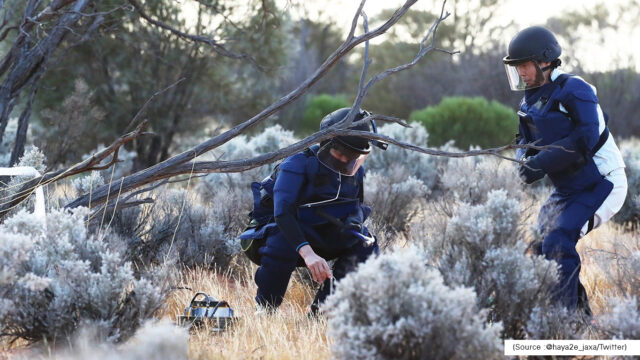December 7, 2020: Japan Aerospace Exploration Agency (JAXA) on December 6 announced that Hayabusa-2 is back with the rare asteroid samples. The samples landed in Australia’s Woomera region, under Royal Australian Air Force, where the team of scientists immediately recovered the samples. The spacecraft dropped the capsule containing samples on December 6 and the recovered capsule will be transported to Japan at JAXA facility in Sagamihara for analysis and storage.
Congratulations poured in from around the world. Australia’s Department of Defence, the US business tycoon and founder of SpaceX Elon Musk, and Japan’s Prime Minister Mr Suga were among many who congratulated the team working on Hayabusa-2.
“I am truly delighted at the successful retrieval of the capsule returned to earth by #Hayabusa2 @haya2e_jaxa space probe, which has traveled in space for six years since its launch. I extend my respect to Professor Tsuda, the project manager who led it to success, and to everyone else involved, and I look forward to the further achievements of #Hayabusa2, which has departed for a new probing mission without pausing,” tweeted Japan’s PM Suga on December 7.
Launched in 2014, Hayabusa-2 is a successor of Hayabusa mission by JAXA. Hayabusa-2 payload is equipped with multiple scientific instruments including remote sensing equipment, sampling devices, and four rovers. The samples were collected by the Hayabusa-2 space probe from the asteroid 162173 Ryugu. The probe surveyed the asteroid Ryugu for a year and half and started its return journey in November 2019.
162173 Ryugu is a carbonaceous near-Earth asteroid of the Apollo group asteroids. Discovered in 1999, Ryugu is classified as a potentially hazardous asteroid (PHAs). The asteroid is 300 million kilometres from Earth. The sample collected from Ryugu might provide information on the origin and evolution of the inner planets including the origin of water and organic compounds on Earth. This study could provide important clues about the origin of life on Earth.
Hayabusa-2’s mission is similar to NASA’s NASA’s Origins, Spectral Interpretation, Resource Identification, Security, Regolith Explorer (OSIRIS-REx) mission that brought back samples from asteroid Bennu late in October 2020. The Hayabusa-2 is now off to its new adventure to asteroid 1998KY26. It is expected to reach the asteroid in July 2031.









